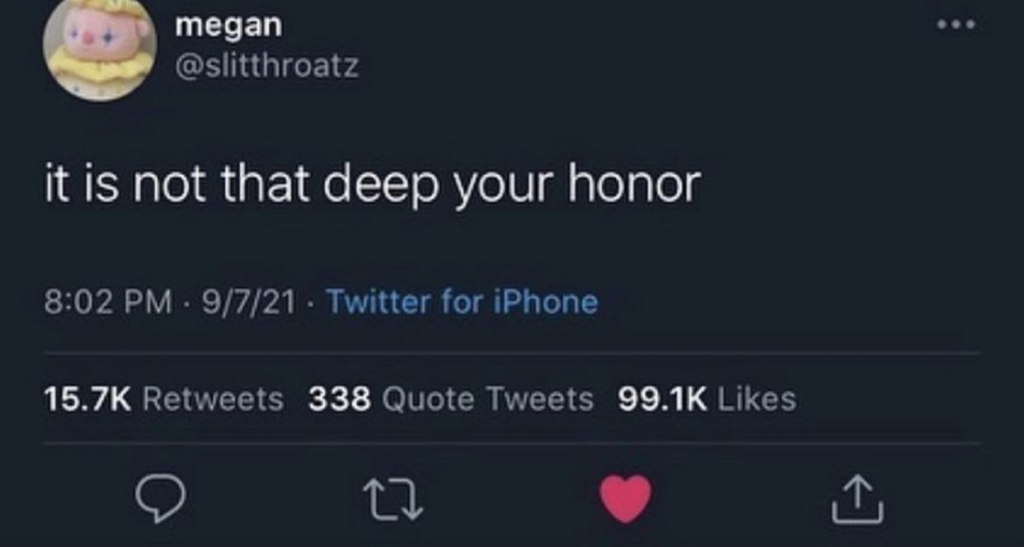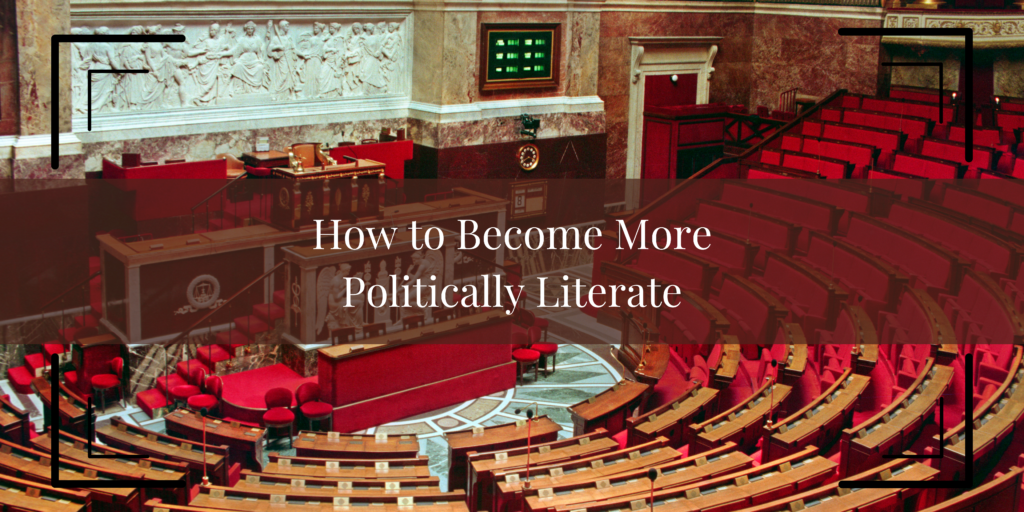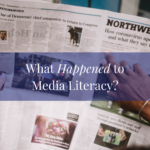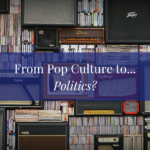“It’s not that deep”
A wave of anti-intellectualism has surfaced across social media. Comments and clapbacks such as “it’s not that deep” or “I ain’t reading all that” are used to shut down debate and engagement with serious topics. Before tackling the phenomenon of anti-intellectualism (a key motive behind this blog) it is important to establish what politics is, what it means for something to be political, and how to become more politically literate and active. By understanding this, we can acknowledge that – whatever it is – probably is that deep.

The P Word
Politics has often been held as a contentious thing. A topic that is unsavory dinner party conversation; something that is to be held personally, engaged with infrequently, and exercised in the voting booth. By making politics synonymous with government, we lose can lose nuance, fall back into party politics during discussions, and focus our ire at individuals (politicians) rather than systems. So let’s begin by first defining politics and government and how they fit together.
Politics comes from the Ancient Greek word politika, which means ‘affairs of the cities’. As most concepts, a universal definition of politics does not exist. For example, if you look at the Wikipedia page for politics you may see the following definitions from an array of politicians and scholars (accessed November 2024):
Harold Lasswell: “who gets what, when, how”
David Easton: “the authoritative allocation of values for a society”
Vladimir Lenin: “the most concentrated expression of economics”
Bernard Crick: “a distinctive form of rule whereby people act together through institutionalized procedures to resolve differences”
Adrian Leftwich: “comprises all the activities of co-operation, negotiation and conflict within and between societies”
What we can understand from these definitions then is a few traits:
- Politics is about resources and how they are distributed
- Politics is about defining moral values of a group of people
- Politics is a system for cooperation
Depending on your personal views, one of these aspects may be more important or relevant. In fact, likely a lot of people fall closer to understanding politics as resource allocation, and thus strictly tied to governance. This is why there is contention when describing something as a ‘political’ issue. If you think of politics solely as a means of resource allocation, then you may not be as quick to consider non-inclusive casting choices as ‘political’.
What’s the big deal?
I would like to challenge what may be the dominant way of thinking, to encourage a wider understanding of politics. Politics for me is about society and cooperation, how we live together, and yes, how resources are distributed. I like to think of politics as an arena, and governance is the sport. We’re all in an arena, but some of us are watching cricket and some of us are watching hockey. In some cases we’re not watching anything. While politics might centre on government, there is a lot happening around government. The excitement might be on the pitch, but we are elbow to elbow in the crowded stands. Your government might provide health care, your employer might be legislated to provide sick leave, but how does your community rally around sickness? Are you ostracized or taken care of? There might be anti-discrimination legislation and hate speech laws, but do people react negatively to your presence or do you feel your difference is accepted? Governance is important (unless you’re an anarchist) and how your society uses that governance is politics. How we cooperate and interact with each other is also politics. So yes, if you consider politics as I do, nearly anything can be political.
How you can become politically literate and active
Last essay I focused on media literacy as a skill that needs to be built and exercised. Similarly political literacy is also an important aspect of our societal obligations. Media and political illiteracy often have disastrous consequences when combined, including the spreading of misinformation and propaganda. Only by understanding political processes and how they interact with media can we combat things like moral panics, hyperpartisanship, and McCarthyist-witch hunts. So what is political literacy?
Building on the definition we developed last essay on media literacy, we might define political literacy as the ability to identify, understand, communicate, and participate in politics and government. I’ve added participation to this definition as it is the end goal of political literacy. It will do you very little to understand the electoral system if you then don’t vote and hold your politicians to account. While I spent the previous section defending the idea that politics is more than government, political literacy is largely about governmental systems and understanding how they work and why. Because in our arena governance is the main focus, I think this is a fair place to start. However, I do encourage people to think about politics on a societal level, outside the governing body. By this I mean how do we treat each other and how do we live in community together.
Political systems and governments are complex. Whether or not that is a deliberate process to keep people out of the government’s business is a debate I’ll leave to you or perhaps pick up in future writing. Many people want to understand and be engaged in politics, however, I think that after secondary school and the end of most people’s formalized education, it can feel like a burden to then return to the basics of how politics works. Both education and media can also tend to focus on the highest levels of government, constantly profiling federal or international politics, rather than focusing on the lower levels of governance, which often have more of an impact on our day to day lives. This is an issues among all ages, not just the youth that may be scapegoated in conversations of political illiteracy. I used to working in the immigrant-serving sector, and one common observation that is shared is that immigrants and new citizens often know more about their new country’s government than citizens born there do. As much as we are taught about government in school, likely we would fail a citizenship test as adults.
Aspects & Skills of Political Literacy
Understanding basic functions of government
What does the government actually do? Well a lot. I don’t feel it necessary to list everything here, but your day is likely punctuated by government, through law, regulation, taxation, and policy. It is entirely important to point out here that it is not necessary or even expected that you care about every aspect of politics. All of us have different interests, passions, and expertise and so theoretically, we should all carry different burdens of engaging on issues. Personally, even though I used to drive a lot in Canada, across major highways, I do not care about construction plans or which roads need to be improved. But I do care about the preservation of parks and green spaces. Find what you care about, and then understand how different levels of government impact these interests. That said, a quick ‘cheat sheet’ to understand which branch is responsible for what: your federal government is most focused on relations with other countries, including trade, immigration, and security. State and provincial governments focus more on big institutions that impact you, think education, health care, transportation (public transit, roads). Your municipal or local government is responsible for making life work for you, utilities, infrastructure (city planning and development), and community building/social welfare/recreation. Depending on where you are, these things could change, and there is a lot of collaboration between the different levels. You may have multiple levels of local government and tribal government. Its worth a quick Google search to find out more about your community!
Laws and Regulations
The government is also in charge of laws and regulations, i.e. what can or cannot be done in society. This can be big, such as ‘it’s illegal to murder someone’ but also that you cannot water your lawn during the heat of the day in summer. There are important documents to consider if you’re interested in law, such as the constitution, human rights codes (domestic), and criminal codes. Of course, you don’t need to have a strong understanding of a lot of these laws and regulations until it impacts your daily life, such as construction regulations and building permits or employment law and industry regulation. That said, I encourage you to read your country’s constitution and any relevant human rights texts, you have to know your rights!
Taxation
Taxes are a universal. Taxes are how the government can fund its operations. Salary is taxed, goods are taxed, houses are taxed. Taxes are determined by different levels of governments. So if you’re in a federal system, you might be paying more for goods in one province/state versus another. Where these taxes go and how they are used is information you can find through your government.
Politics vs Policy
Policy is the vehicle for governmental politics. Platform goals from politicians will be turned from election promises to a developed policy that passes through an approval process. This process has input from political actors across party lines and with bureaucrat and expert help (hopefully). A big campaign promise will be transmuted into something different, once more voices impact the text of policy. Policy states how things ought to be done, and who is responsible for enacting the measure. So, a policy that wants to support more immigration, specifically skilled labourers, would provide a target/benchmark/quota for immigration departments to meet. This would maybe include some sort of advertisement campaign and developing mobility schemes with certain countries. When evaluating candidates’ platforms, it can be good to think about how doable certain platform points are. Understanding the approvals and different departments/governing bodies that would be required to come to the table can help assess whether the candidate understands the scope of their position. Entire reforms of things like education and health care are extremely difficult and require coordinated plans of action and cross-partisan support. Some times, promises are way too good to be true.
Voting
Voting is the easiest way to have your voice heard. Depending on your political system, you could be voting multiple times for different offices and plebiscites throughout the year. Voting campaigns are often targeted on the federal level (president, prime minister), however local elections are just as important and your vote will likely go further. My parents always encouraged me to vote with the simple idea that voting is your ticket to complaining. If you don’t bother showing up to the polls, then why would I listen to what you have to say? Of course this is a simplification of a critique of voter apathy and doesn’t give space to real barriers to voting, such as taking time off, voter suppression, lack of transportation etc. Voting is where political participation starts, but it should not be where it ends. If your measure doesn’t win, complain to your elected officials, that’s what they’re there for. If your candidate doesn’t win, find the parts of their platform you liked the best and talk to your new representative about their ideas.
Public Forums
Have you ever seen Parks & Recreation? So those town meetings they show aren’t too far off from how these things usually go. But still, showing up and talking to your representatives (elected or otherwise) is good way to stay informed and active in the future of your community, city, and province/state. As much as it would be more fun to attend a Stars Hollow town meeting with an eccentric town selectman, the reality is likely your fellow citizens are going to be the weird ones in the room. Again, you can always show up to politician’s offices, send emails, and call to share your thoughts, they do work for you.
How to Debate
Understanding how to debate is useful in a few ways. Not only does it help you have better conversations with friends, family, and coworkers, but it helps you spot bad arguments in politicians. Debate can sound intimidating, but at the end of the day, it is about forming arguments and defenses for the ideas you have and support, and responding to other people’s ideas and positions. Likely you learned these skills in some sort of English or Social Studies classes in secondary school when learning how to write essays. Arguments should be supported by evidence and a variety of sources. Your ‘opponents’ positions and arguments should be refuted and challenged on this basis. It might sound very simple and idealistic to say this is what debate is, considering the spectacle of public debates. If you had asked me a few years ago, I maybe would have said that at the very basic level people understood to keep debate ‘above the belt’, that debates were at their core about thought-out positions and evidence. However, the current state is showing that the decorum of times past has faded in lieu of personal attacks and emotive pleading. (Emotions are not bad in debate, but overly strong appeals to emotion by politicians are likely a tactic to distract from a lack of evidence).
Evaluating Politicians
I’m personally of the mindset that anyone can be a politician. If you live in a community, you have the understanding to serve your fellow man. You don’t have to have gone to university, studied political science, or have years of experience. That said, when it comes to comparing candidates, knowledge of the political system should be a bare minimum. Do the candidates have an understanding of how change happens in the system, the different branches of government, and how their position fits into the bigger picture? If your politician for local office claims that one of the main pieces of their platform is extensive health care reforms, then they probably don’t have a great understanding of what their position will entail. For any specialized position, experience or education in that field would be ideal. For example, I would much more likely support a candidate for school board trustee that has a background in schools or with youth. Maybe these specialized roles aren’t elected positions all the time, but you should be wary of someone with anti-science views leading any sort of health care department. Evaluating candidates should never discount someone because of their culture, religion, gender, level of education, age, etc. Anyone can be a politician, and in fact, our systems would likely be stronger if we had more ‘ordinary’ people running for office rather than career politicians.
The Intersection of Pop Culture and Politics
So this is all well and good, but isn’t this blog about pop culture? Well yes. But its important to understand how politics and government are present in our societies to understand the role of popular culture. The explicit purpose of the blog is to promote political and media literacy through pop culture that people are familiar with. Pop culture is more widely discussed than political reform. So what if we understood pop culture and its political context? Understanding these relationships can help us develop more political literacy and participation. As someone who loves Parks & Recreation, I think that show did a lot for getting people interested in, well, parks and recreation in their own communities. Not every piece of media is going to have such an obvious connection to politics, The Office says more about working culture and community than it does about employment law.
Pop culture reflects our society, our governance, our politics. Pop culture allows us to reflect on where we’ve come from, where we are, and where we might like to go. And in the next essay, we’ll finish the foundation series for the blog and discuss the relationship between politics and pop culture.


